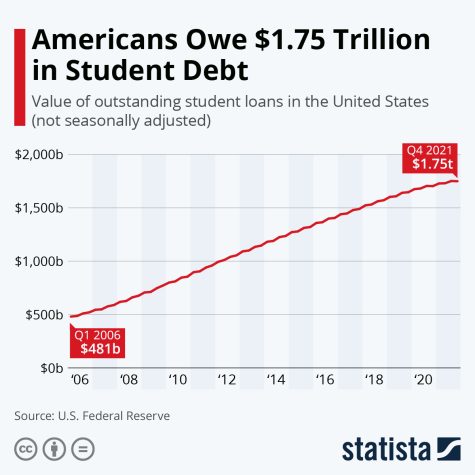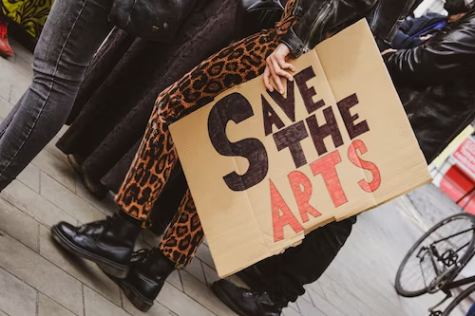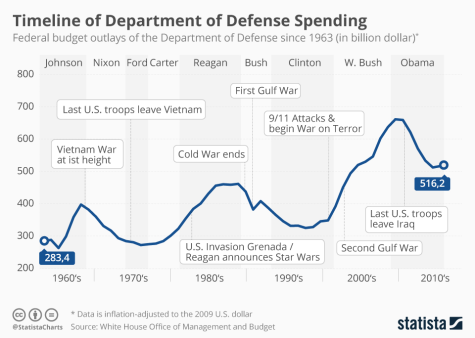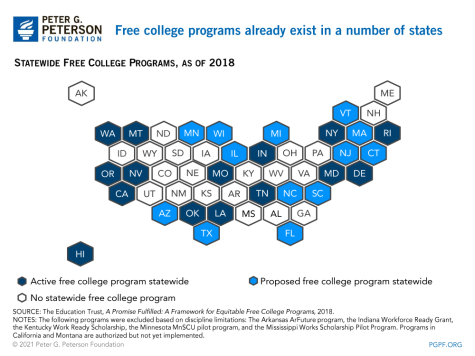Issues With Higher Education

January 31, 2023
College was once the path to a better future. In 21st century America, it has devolved into a path for a certain few to line their pockets more.
The pursuit of knowledge has long been a hallmark of humanity. From Aristotle to Plato to Marcus Aurelias, great thinkers have defined our history, ushering in new eras of not only academic thought, but time itself, the Enlightenment for example. Today, higher education is more accessible than ever.
“Nor am I less persuaded, that you will agree with me in opinion, that there is nothing which can better deserve your patronage than the promotion of science and literature. Knowledge is in every country the surest basis of public happiness.” – George Washington, 1790 Annual Message
As we can see, there are few values more American than the respect for a quality education. College now has progressed past being the training grounds for lawyers and pastors alone, though.
Long gone are the times where schooling was only an option for the privileged. We now view education as more of a human right than a luxury. So in a time of uncertainty and nihilism, where everyone is searching for answers, why is college enrollment slowly declining, nearly 10% in America since 2010?

Colleges are plagued by several issues, but chiefly, the cost of college in America has been contributing to the decline in enrollment. As of 2022, college tuition and fees among public universities had increased 179.2% over the previous twenty years. It goes without saying that wages have not grown almost 200% to match the increased price, so it is now much more of a financial gamble to try to attend college.
“I guess it’s nearly impossible to go to school without having a full time job,” said Mia Farr, a junior at UWF. “Having a job causes you to not do that good in school because you don’t have time for anything.”
Americans are going into life-crippling debt because we have been told our whole lives that college is the way to find a good job. As of the end of 2022, Americans combine for $1.745 trillion in loan debt. Our sum of student loan debt is more than many smaller nations rake in annually.
Katie Weeden has lived in Pensacola her whole life; after high school she wanted to pursue her higher education. “I just haven’t been able to,” Katie said. “I don’t want to have to take out loans and go into debt for a degree.”
One issue lies in the attitude America has, as a whole, about the importance of working. Studies show that those who actually participate in higher education, and especially those who receive degrees beyond a bachelors, view college as a place for growth. Those with little or no experience in college believe it is more about learning specific skills for a specific job, or, in other words, a trade school.
The purpose of education and exposing oneself to new perspectives and ideas has never been solely for financial or occupational enrichment. The purpose of, specifically higher education, has historically been personal growth, enrichment, and development. Now, in America’s work centric climate, college is seen as a means to an end, a 9-5 that allows for a suburbian existence.
We don’t work purposeful jobs, most of us do not feel like our professions accurately reflect our passions. Under our current confines of late-stage capitalism, everything has been or will be assigned a monetary value; if an activity doesn’t produce value immediately, or if the value is more figurative than tangible, it is ostracized by many.
We see this constantly through the criticism of liberal arts majors. The liberal arts and the arts fields in general have been two of the biggest examples of the judgment of paths that don’t explicitly lead to employment.
 This stigmas around different majors and the view that college should directly translate into employment are exacerbated more by hustle culture. There are TikTok influencers telling their bases of largely teenage boys that if they don’t have a Lamborghini before thirty that they need to reassess themselves.
This stigmas around different majors and the view that college should directly translate into employment are exacerbated more by hustle culture. There are TikTok influencers telling their bases of largely teenage boys that if they don’t have a Lamborghini before thirty that they need to reassess themselves.
The American ideals of money and profit being key combine currently with our stagnant wages and increased price of living, which is placing even more strain on those looking to further their education.
Worldwide, 66% of countries offer either free or very affordable (under $2,000) schooling, and there are even 10 countries who do not charge international students more than their domestic counterparts. In America, the end of 2022 saw an average yearly cost of $25,707 for in-state on campus students, for out-of-state institutions students find themselves paying $43,201 annually.

The solution to the problems facing higher education should, at least in part, come from a reallocation of our annual budget for the military. We are now spending more than we spent militarily at the peak of the Cold War, The Iraq War and the Vietnam War.
As of fiscal year 2023, the budget set forth by our administration called for over $770 billion for the Department of Defense alone. The Department of Education received just $88.3 billion for the same period, 11.4% of the DOD’s allowance.
It should be noted that our military budget is more than the next nine highest military budgets combined globally. Those we view as our closest competition, like China and Russia, are undoubtedly a threat, but our spending in the area is so much greater that we can afford to step on the brakes a little.
With a simple reallocation of funds, reduced price or even free schooling would turn from a dream to reality. This simple fix would snowball into benefits beyond just a higher enrollment rate. Americans would have to work less hours, have less debt, have more freedom financially and experience a revitalized middle class.

America as a whole refuses to provide a baseline; our states differ greatly in the amount of help given to students.
We don’t even have to pay for everyone’s school. A program that gave aid to students whose parents make less than, say, $300,000 a year would cut down how much aid we give out, and with a threshold so high, more than Biden’s proposed $125,000, we know for sure that those not paid for by the government are still more than capable of receiving schooling. Of course, should it be possible, there need not be any threshold.
As the world’s major power of the last 150 years or so, there is a lot that we have taught the world. Inversely, it’s time we learn from our contemporaries and start changing our habits around higher education.

